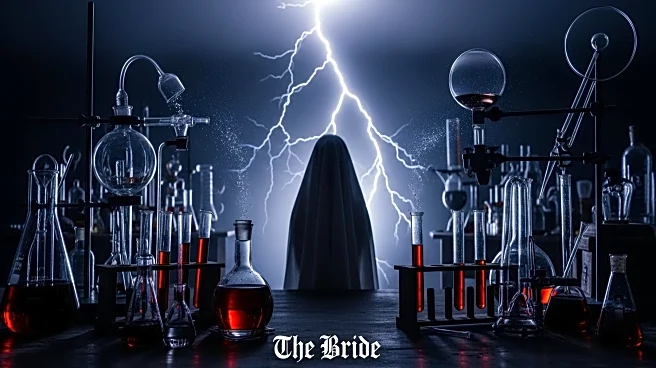What's Happening?
Maggie Gyllenhaal is set to release her sophomore directorial feature, 'The Bride,' which offers a dark and edgy twist on the classic Frankenstein tale. The film, set in Great Depression-era Chicago, follows a character named Frank, played by Christian Bale, who enlists Dr. Euphronius, portrayed by Annette Bening, to create an undead soulmate. The narrative unfolds with unexpected elements such as murder, possession, and a radical cultural movement, culminating in a combustible romance. The trailer, released by Warner Bros., showcases Jessie Buckley as the platinum blond bride of Frankenstein, navigating her existence between loyalty and curiosity. The film is scheduled to hit theaters in March, promising a unique take on Mary Shelley's 1818 novel and the 1935 film 'Bride of Frankenstein.'
Why It's Important?
The release of 'The Bride' marks a significant moment in contemporary cinema, as it revisits and reimagines a classic literary and cinematic narrative through a modern lens. Maggie Gyllenhaal's involvement as director, writer, and co-producer highlights her growing influence in the film industry, following her acclaimed debut with 'The Lost Daughter.' This adaptation not only contributes to the ongoing cultural dialogue surrounding Frankenstein but also showcases the potential for innovative storytelling in Hollywood. The film's exploration of themes such as identity, creation, and societal norms may resonate with audiences, offering both entertainment and reflection. Additionally, the involvement of high-profile actors like Christian Bale and Annette Bening adds star power, potentially attracting a wide audience and impacting box office performance.
What's Next?
As 'The Bride' prepares for its theatrical release in March, anticipation builds around its reception and impact. The film's unique approach to the Frankenstein mythos may spark discussions among critics and audiences, potentially influencing future adaptations of classic tales. Maggie Gyllenhaal's continued success as a director could lead to more opportunities for her to helm projects that challenge traditional narratives. Furthermore, the film's release coincides with Guillermo del Toro's 'Frankenstein,' which may lead to comparisons and discussions about different interpretations of the same source material. The success of 'The Bride' could also encourage studios to invest in more creative and unconventional projects, expanding the scope of storytelling in Hollywood.
Beyond the Headlines
The adaptation of Frankenstein in 'The Bride' raises questions about the ethical implications of creation and the pursuit of perfection. By setting the story in the Great Depression era, the film may draw parallels between historical and contemporary societal challenges, such as economic disparity and cultural upheaval. The narrative's focus on radical cultural movements and outlaw romance could reflect broader themes of rebellion and transformation, resonating with current social dynamics. Additionally, the film's portrayal of complex characters and relationships may offer insights into human nature and the consequences of ambition, providing a platform for deeper philosophical and cultural exploration.










